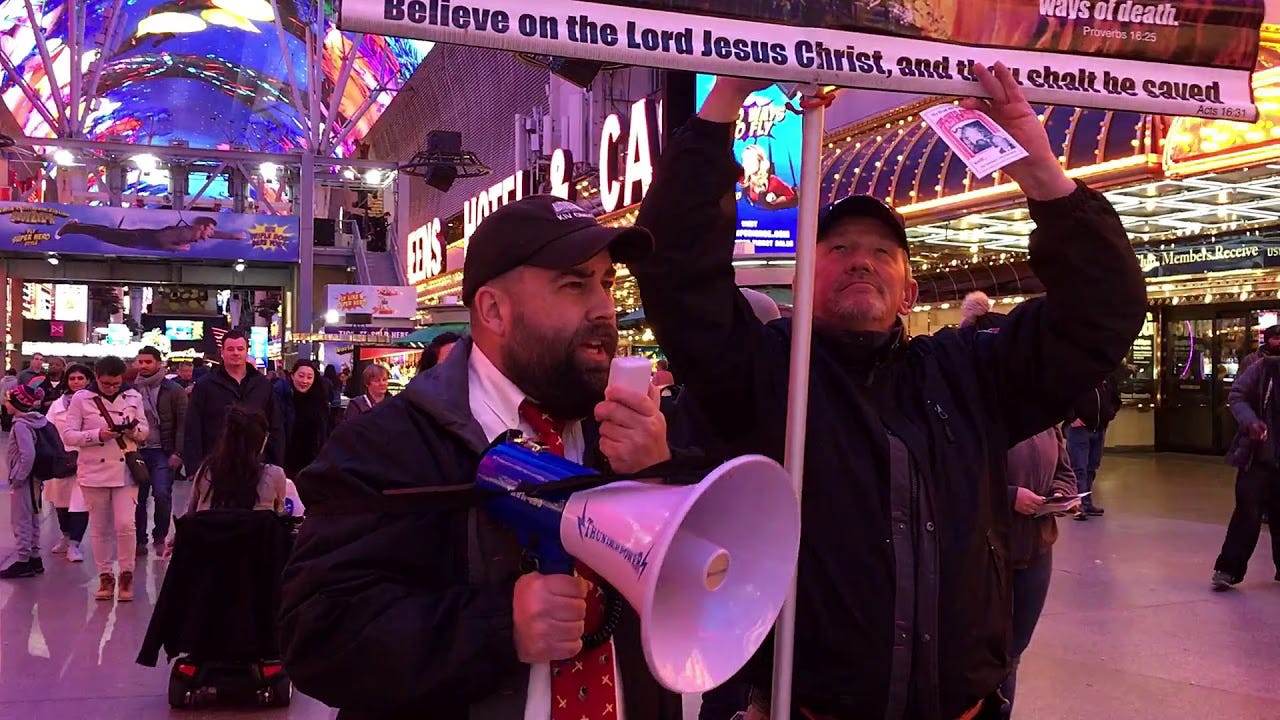Rebuking in the Gospels. What Gives?
Jesus rebuked spirits; the Pharisees rebuked Jesus; disciples rebuked kids. What does it even mean to "rebuke," anyway?
Street Preachers Rebuking in Vegas
Last week I was in Las Vegas for a couple days (my friends gifted me an experience for a world tour of whisky tastings 😋). As you might know, last week in Vegas was also the home for the Super Bowl.
It was a bit o’ madness, for sure.
My biggest takeaway, though, while walking the strip on Friday morning amongst all the pop-up NFL tents and broadcast booths and CBS fan events, was the absolutely in your face prevalence of bullhorn preachers.
I’ve been to Vegas one other time and remember seeing maybe one or two on the streets, but no exaggeration there was a new preacher every 100 yards on both sides of the boulevard. Louder than the music, louder than the casinos, louder than the fan experiences and street performers, the ear piercing, soul-crushing, gag-inducing shouting from these “preachers” rose above it all.
I hated it.
These guys (and yeah, they’re always guys) accomplish approximately zero good as far as I can tell. Yet their detriment to the name “Christian” is palpable as they hold picket signs that list off all the people they rail against, and as they look passersby in the eyes with words of judgement and condemnation.
Truly, these people make me want to reconsider both my profession (preacher) and religious affiliation.
Jesus Was also a Rebuker, Though
Which brings me to the next thing I want to say about this story I’ve been writing about in Mark chapter 1, the story of Jesus’ first public act of ministry.
I started by pointing out how Jesus’ sermon in the synagogue blew people’s minds because he taught with a surprising authority, and because he taught from his own inner experiences of the Divine rather than simply regurgitating the Rabbis before him).
Then, after that I unpacked a bit of the part or the story where an evil spirit showed up and tried to resist Jesus. My takeaway there was to offer a way of thinking about this “spirt” that goes beyond just a literal demon taking over some dude’s body. In short, I suggested that what Jesus went to battle against was the very notion that a person could be “unclean.” The concept that some people can somehow be rendered unacceptable to God was an appalling thought to Jesus, and he cast that wicked energy out!
Actually, the Greek says that he “rebuked” the evil spirit.
So… in the spirit of (lol, get it?) the bullhorn preachers from Vegas, I really want to dive in to this whole “rebuking” thing. Or as the CEB translates it, “speaking harshly”…
Mark 1: 23-26
23 Suddenly, there in the synagogue, a person with an evil spirit screamed,
24 "What have you to do with us, Jesus of Nazareth? Have you come to destroy us? I know who you are. You are the holy one from God."
25 Jesus rebuked the demon. "Silence! Come out of him!"
26 The unclean spirit shook him and screamed, then it came out.
What does it mean to rebuke?
And is it something we (aka, not-Jesus) should ever do?
Great questions, Colby.
Thanks, Colby!
Let’s get in to it, shall we?
The Strange Greek Word behind “Rebuke”
The Greek word in question here is epitimao, which is made from epi (on, in, upon) and timao (to give honor, to set the price of, to value).
Right out the gate I wonder if your reaction is similar to mine: how does a word that, at face value, literally means “to give honor upon,” end up being translated as “rebuke,” and gets used in contexts such as Jesus and this evil spirit?
Not an easy question, but let me take a stab at it…




